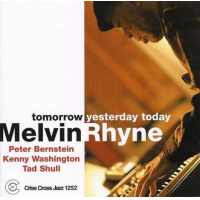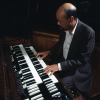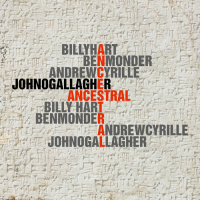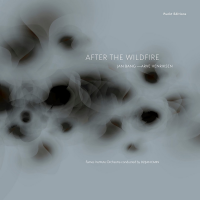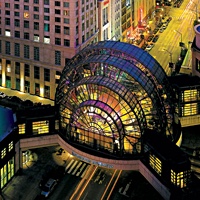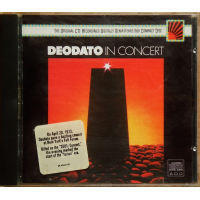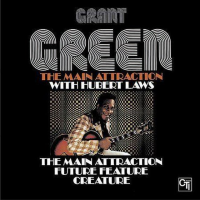Home » Jazz Articles » Liner Notes » Melvin Rhyne: Tomorrow Yesterday Today
Melvin Rhyne: Tomorrow Yesterday Today
As this writer stated in the notes to Rhyne's previous Criss Cross release, Classmasters (Criss Cross 1183), the organist is "currently taking advantage of the cyclical nature of fads and stylistic 'ins' and 'outs.'" Since 1992's The Legend (Criss Cross 1059), Rhyne has released six dates as a leader for Criss Cross, in addition to the two discs he co-led with the The Tenor Triangle. He's also been busy on the jazz festival circuit around his hometown of Indianapolis. "I've been to St. Paul a few times for festivals this past summer and we were at a club there for a two-day hit. This year I've also been to Evanston at Pete Miller's jazz club. Of course, I do work [in town] with the Jimmy Coe big band. He was a writer for some of the bands that came through at the time and he was on the scene when Charlie Parker and all those cats were with Billy Eckstine." Even with these opportunities, Rhyne counts himself lucky considering that the outlets for jazz these days are dwindling. "You know Indiana Avenue is sort of bulldozed into the future, so to say, and that's where a lot of music originated."
As willing to play a gig for local senior citizens as he is to make a tour of Europe with an all-star cast of up and coming musicians, Rhyne laments the current state of creative music, but has as his goal a desire to bring today's generation into the fold. "We have been kicked to the curb. But the good thing is there are still a lot of young and old people that love the music and it's too late [for me] to change now anyway. Jazz is a quiet thing, like classical music. You know it's around but you don't get to hear it unless you make a special effort. My main concern is that young people get exposed to jazz and classical music as well as the normal stuff they're exposed to because there are a lot of kids that would benefit from knowing that there's something else out there besides what they're getting."
Although it's been four years since the last time that Rhyne had the opportunity to make it to the studio for a date with this most sympathetic of trios, there's an unspoken sense of togetherness and camaraderie that is apparent here which speaks to the transcendence of time. "It's always a pleasure to work with Peter Bernstein and Kenny Washington and on this recording we also have Tad Shull," Rhyne says. "So it's good not only to get to see those guys but also get to play with them. It's almost like being on a different planet or something. This trio's done a lot of recordings, although we've never really worked together that much. We did get to go to Japan with Lou Donaldson for 10 days in 1998 where we played at the Blue Note."
As for Bernstein, the guitarist is constantly in demand as one of the premier players of his generation. He functions extremely well in an organ combo setting as evidenced over the years by his fruitful association with Larry Goldings. As a modern day proponent of the type of single note lines made popular by '60s legend Grant Green, Bernstein places a premium on melody and phrasing, a point not missed on Rhyne who happened to work with Green for a short period in the late '60s. "I would try to hang him [Green] up while we were playing and I couldn't manage to do it," says Rhyne with a chuckle. "He could always find some kind of way to get around."
An avid collector of jazz recordings and the past host of WBGO radio's Big Band Dance Party, Washington is a walking encyclopedia of knowledge when it comes to the music and his expertise as a drummer has led to appearances on record that number in the upper hundreds. "He talks about how George Brown played on the Wes Montgomery recordings," Rhyne explains in regards to making a recording session with Washington. "But you know I never thought too much about younger people coming up and being influenced by the music and I guess there's a lot of them. You know, once you record a CD or record, who knows who's listening."
In addition to the trio on hand, tenor saxophonist Tad Shull is also added to the fold on four tunes. "Gerry mentioned it to me, the idea of having Tad on the date, to add a little more variety to some of the songs. We haven't done a lot of jobs, but we recorded a couple other CDs like Tell It Like It Is (Criss Cross) and Aztec Blues (Criss Cross)." Keeping with the mood of the session on a whole, Shull's contributions recall the type of big-toned sound that was part and parcel of the creative muses of men like Gene Ammons, Ben Webster, and Jimmy Forrest. Although we don't get to hear him nearly as much as we'd like, Shull can be sampled at even further length by consulting his own two Criss Cross gems, Deep Passion (Criss Cross 1047) and In The Land Of The Tenor (Criss Cross 1071).
As for Mel's snappy arrangement of the opener, "Lover Come Back To Me," he states without a hint of pretense, "I try to freshen them [the standards] up a little bit. That's a tune I really like and although we had about two or three takes on that, I decided to use the first one." In addition to solos from Rhyne and Bernstein, the pair trade eights with Washington prior to the return of the head and the tune's wry conclusion.
It's Sunday morning and the congregation is filled with the gospel spirit as Rhyne ushers in Kenny Dorham's "Buffalo," a rollicking number that the trumpeter first debuted on his 1961 Blue Note masterpiece Whistle Stop. "His tunes always have some excitement to them and it kind of reminds me of B.B. King's things," Mel says in regards to this tasty shuffle. "It's that toe-tapping type of thing that gets the job done, but [of course] the blues do that anyway."
The history of Wes Montgomery's "Jingles" goes back to 1959's The Wes Montgomery Trio when Rhyne made the scene with the iconic guitarist and drummer Paul Parker. Later versions would show up on the Riverside classic Bags Meets Wes and the 1960 Fantasy release The Montgomery Brothers. As for its inclusion here in two slightly different versions, Mel takes no direct credit. "Those guys wanted to do that, which shows just how much influence Wes still has."
A favorite of jazzmen going back to Miles Davis's quintessential Birth of the Cool sessions or perhaps even farther, "Darn That Dream" features another wonderful ballad performance by Shull. "I love those kinds of songs and this one turned out pretty good."
Adding to the diversity of this program of select standards, Mel contributes two of his own blues compositions. The slower of the two, "Five Flat Minor," takes as its title a literal description of the key the piece is built around. An African word for 'melody,' "Niambi" moves along at a quicker pace and finds both Rhyne and Bernstein participating in friendly dialogue just prior to the tune's end.
Bernstein furnishes the clarion call for a gentle Latin groove that sends "Enchantment" wafting along in style. "That's one of those Horace Silver tunes that turned out so well on the original recording that we tried to see what we could do with it," states Rhyne. As just one of the trinkets that made Silver's Blue Note session Six Pieces of Silver such a revelation, this number sounds as fresh today performed by Mel and the guys as it did back in 1956 in its initial distillation.
Rhyne simply calls "Tangerine" "a tune that just popped up." Shull is in the mix for this one too and he voices the melody with a bit of a swagger and a lively tip of the hat to men like Buddy Tate and {[Paul Gonsalves}}. Take special note of his preaching during the tune's closing vamp and that low-register honk that gives his closing cadenza some added sparkle.
"Easy Living" points out Rhyne's great talent for ballad performances, never indulging in the saccharine or overwhelming things by literally pulling out all the stops. Instead he caresses the melody with taste and a minimum of histrionics. "When I want to do ballads, I always think about having something that's easy to listen to," Rhyne explains. Shull recalls the archetypal swing era tenor man with a juicy and voluptuous tone that is a pleasant throwback to an earlier time. "That's a good sound and I like to hear organ and saxophone; it's just made for ballads."
Be it a nod to his peers like Montgomery and Silver, or a taste of the blues through his own simple, yet effective originals, Rhyne gives a good indication of where he's been and where he's headed on Tomorrow, Yesterday, and Today. The album also bodes well for his continued viability as one of the most musical and creative organists of his generation.
Liner Notes copyright © 2026 C. Andrew Hovan.
Tomorrow Yesterday Today can be purchased here.
Contact C. Andrew Hovan at All About Jazz.
An avid audiophile and music collector, Chris Hovan is a Cleveland-based writer / photographer / musician.
Track Listing
Lover Come Back To Me; Buffalo; Jingles I; Darn That Dream; Niambi; Five Flat Minor; Enchantment; Tangerine; Easy Living; Jingles II.
Personnel
Melvin Rhyne
organ, Hammond B3Peter Bernstein
guitarTad Shull
saxophone, tenorKenny Washington
drumsAlbum information
Title: Tomorrow Yesterday Today | Year Released: 2003 | Record Label: Criss Cross
Tags
PREVIOUS / NEXT
Support All About Jazz
 All About Jazz has been a pillar of jazz since 1995, championing it as an art form and, more importantly, supporting the musicians who make it. Our enduring commitment has made "AAJ" one of the most culturally important websites of its kind, read by hundreds of thousands of fans, musicians and industry figures every month.
All About Jazz has been a pillar of jazz since 1995, championing it as an art form and, more importantly, supporting the musicians who make it. Our enduring commitment has made "AAJ" one of the most culturally important websites of its kind, read by hundreds of thousands of fans, musicians and industry figures every month.

